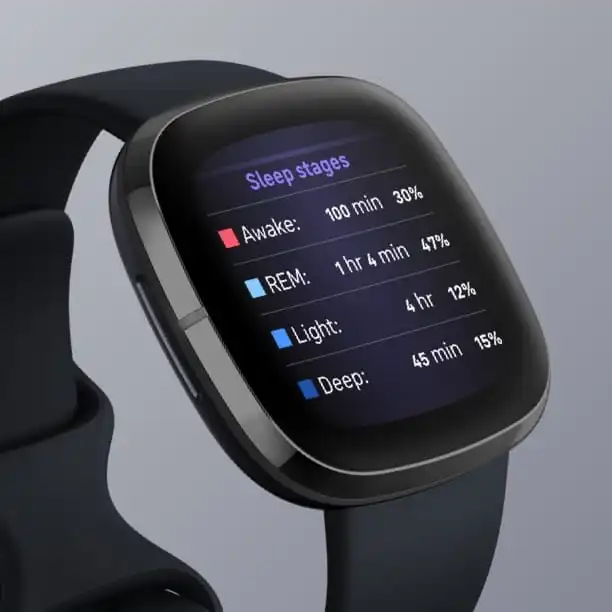Getting a good night’s sleep is crucial for maintaining physical and mental well-being, but how do we know if we’re really getting enough?
That’s where Fitbit comes in, offering a wearable technology that tracks daily activity, including sleep.
Wear your Fitbit slightly higher on your wrist than you would during the day. This can help ensure that the device is in the optimal position to track your sleep accurately.

Also, make sure that the band is comfortable and not too tight, as this can affect the device’s ability to track your sleep.
Additionally, if you find that wearing your Fitbit to bed is uncomfortable, try wearing it on your non-dominant hand, or take it off before going to sleep and put it back on as soon as you wake up to get an accurate reading
But have you ever wondered exactly how Fitbit tracks sleep?
Fitbit can accurately detect when a user is sleeping and provide detailed information on their sleep patterns, including sleep stages such as light sleep, deep sleep, and REM sleep.
Fitbit also provides users with a sleep score that rates the quality of their sleep based on factors like sleep duration, sleep stages, and sleep schedule consistency.
With these tips, you can optimize your Fitbit sleep-tracking experience for better insights into your sleep patterns and overall health.
An exhaustive review of Fitbit’s sleep-tracking capabilities
I will explore how Fitbit tracks sleep and its benefits for users.
Different Sleep Stages Of Fitbit

Fitbit tracks sleep stages through different sensors, such as the accelerometer, which measures movement, and the photoplethysmography (PPG) sensor, which measures heart rate.
Sleep stages consist of four stages: light sleep, deep sleep, REM sleep, and being awake.
Deep Sleep and Fitbit
Deep sleep is the stage where physical recovery, long-term memory consolidation, and mental recovery occur. Fitbit detects this stage through the combination of movement and heart rate data.
Fitbit provides the duration of deep sleep, which is crucial for understanding sleep quality.
REM Sleep and Fitbit

Rapid eye movement (REM) sleep is the stage where dreams occur and brain activity is most active.
Fitbit detects this stage by monitoring heart rate variability, which helps in detecting if the person is in the REM stage. Fitbit provides information on how long a person spent in the REM sleep stage.
Light and Deep Sleep and Fitbit
Fitbit tracks light and deep sleep through the combination of movement and heart rate data. Fitbit provides information on how much time a person spent in each sleep stage, which is useful in understanding sleep quality.
Sleep Score and Fitbit

Fitbit provides users with a sleep score to understand the overall quality of their sleep. The score is based on the person’s time spent asleep, sleep stages, and consistency of their sleep schedule. Fitbit provides a nightly sleep score, which helps in understanding sleep quality over time.
Using Fitbit to Track Sleep
Using Fitbit to track sleep is an excellent way to improve sleep habits. By tracking sleep, users can identify any potential sleep issues, such as insomnia, sleep apnea, or restless leg syndrome. It can also help in identifying how different factors, such as exercise, diet, and stress, can impact sleep quality.
Fitbit App and Sleep Tracking

The Fitbit app is where users can view their sleep data. The sleep tile on the app provides a summary of the person’s previous night’s sleep. Users can also view monthly sleep analyses, which helps in understanding sleep patterns over a more extended period.
Personalizing Your Fitbit Sleep Tracking Experience
Personalizing the sleep tracking experience is crucial for optimal results. Fitbit provides users with the option to set a sleep goal and a consistent sleep schedule. Additionally, the Smart Wake feature wakes users up during their light sleep stage, which makes waking up less disruptive.
My Fitbit’s 10-Day Battery Life is the Stuff of Dreams

One of the biggest advantages of using a Fitbit for sleep tracking is its long battery life. Many Fitbit devices have a battery life of up to 10 days, which means users can wear their devices around the clock without worrying about recharging.
This is especially helpful for sleep tracking, as users can wear their device to bed without worrying about it running out of battery in the middle of the night.
The Smart Wake Feature Made Mornings Less Groggy
The Smart Wake feature is a popular feature of Fitbit devices that helps users wake up feeling refreshed and energized.
This feature uses data on a user’s sleep patterns to determine the best time to wake them up during their lightest sleep stage, which can help them wake up feeling less groggy and more alert.
Users can set a wake-up window, and their device will wake them up at the best time within that window.
Fitbit Premium and Sleep Tracking

Fitbit Premium provides users with more in-depth sleep data and insights into their sleep patterns. The sleep section of Fitbit Premium provides personalized sleep guidance and recommendations for better sleep habits.
Which Fitbit is best for sleep tracking?
Fitbit has several devices that are excellent for sleep tracking. The best Fitbit for sleep tracking depends on your specific needs and preferences. Here are some Fitbit devices that are great for sleep tracking:
- Fitbit Sense – This device has advanced sleep tracking features, including monitoring of oxygen saturation levels and a Smart Wake feature that uses an alarm to wake you up during your lightest sleep stage.
- Fitbit Versa 3 – This device has all-day heart rate tracking and uses a combination of movement and heart rate data to provide detailed sleep-tracking information.
- Fitbit Charge 4 – This device is a great option for those looking for a budget-friendly option with sleep tracking. It tracks sleep stages and duration, as well as other health metrics like heart rate and activity levels.
- Fitbit Inspire 2 – This device is another budget-friendly option with excellent sleep-tracking features. It tracks sleep stages and duration, as well as other health metrics like heart rate and activity levels.
Overall, the best Fitbit for sleep tracking depends on your specific needs and preferences. Consider the features that are most important to you and choose a device that meets those needs.
Conclusion
Fitbit has revolutionized sleep tracking by providing users with detailed data on sleep stages, time spent asleep, sleep duration, and sleep quality.
By tracking sleep, users can identify any potential sleep issues, improve sleep habits, and improve overall sleep health.
Fitbit’s technology provides users with the tools to personalize their sleep-tracking experience for optimal results.
FAQS
What Should I Know About Fitbit Sleep Stages?
Fitbit sleep stages refer to the different stages of sleep that occur throughout the night, including light sleep, deep sleep, and REM (rapid eye movement) sleep. Fitbit uses a combination of movement data and heart rate tracking to detect each stage and provide users with detailed information on their sleep quality. Understanding these sleep stages can help users improve their sleep habits and overall health.
How Does Fitbit Know You Are Sleeping?
Fitbit uses a combination of movement data and heart rate tracking to detect when a user is sleeping. The accelerometer sensor in the device tracks movement, which helps to detect when the user is asleep or awake. Additionally, Fitbit devices use photoplethysmography (PPG) sensors to measure heart rate, which changes during sleep. By combining these data points, Fitbit can accurately detect when a user is sleeping and provide detailed information on their sleep patterns.
How the Fitbit Premium Sleep Profile Works
Fitbit Premium is a subscription-based service that provides users with access to advanced sleep-tracking features. One of these features is the Sleep Profile, which provides personalized insights and recommendations based on a user’s sleep data. The Sleep Profile analyzes sleep data, including sleep stages, duration, and quality, to help users better understand their sleep patterns and make positive changes to improve their sleep habits.
How to Improve Your Fitbit Sleep Score?
Fitbit provides users with a sleep score that rates the quality of their sleep. This score takes into account factors like sleep duration, sleep stages, and sleep schedule consistency. To improve your Fitbit Sleep Score, you can focus on creating a consistent sleep schedule, making sure you’re getting enough sleep and making positive lifestyle changes like reducing caffeine and screen time before bed.





